A Fulbright Fête
Eight exceptional USC Dornsife students have been selected for the prestigious Fulbright Fellowship, awarded for academic achievement and commitment to cultural engagement.
USC has been recognized as among the top 40 research institutions in the United States to cultivate Fulbright Student Grant recipients, according to the Fulbright Program, the U.S. government’s flagship international educational exchange program.
Established in 1946 and sponsored by the United States Department of State’s Bureau of Educational and Cultural Affairs, the Fulbright is the largest international fellowship program in the U.S. Each year, about 2,000 grants are given to support independent study, research and teaching in more than 150 countries worldwide.
In the past five years, 46 USC Dornsife students have earned this honorable distinction. The 2014-15 Fulbright recipients include:
Cultural Illumination: Brendan McMahon
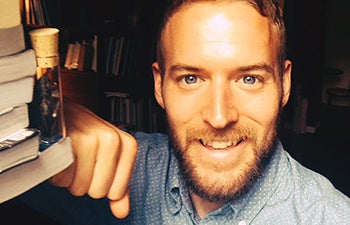
Brendan McMahon, a Ph.D. candidate in art history, will travel to Mexico to study how the Spanish Empire’s interest in objects made with iridescent materials fits in with intellectual debates of the period regarding the limitations of vision and the mechanics of sight. Photo courtesy of Brendan McMahon.
The shimmer and colors reflected by hummingbird feathers and mother of pearl were greatly admired in the 16th- and 17th-century Spanish Empire, which also encompassed colonial Mexico, some of the Philippines and other regions. With hues constantly changing in relation to the angle of observation and illumination, these prized objects were incorporated in clothing, ornaments and paintings.
Unlike colors produced by pigments, the rainbow-like iridescence is the product of tiny structures that refract light. Brendan McMahon, a Ph.D. candidate in art history, has been studying how the early-modern Spanish world’s interest in the visual qualities of iridescence relates to intellectual debates of the period that centered on the validity of data gathered by the naked eye.
“Iridescent materials challenged the veridicality of sight because of the qualities of their shifting colors,” McMahon said. “At the same time, they implicated light itself as the primary mechanism of color, and of vision overall.”
McMahon will use his Fulbright to travel to Mexico to visit archives such as the Archivo General de la Nación and the Archivo Histórico de Notarías, both in Mexico City, which contain written inventories from the period describing iridescent objects. In addition to these written descriptions, he will study iridescent objects that survive in local collections at length since the optical effects of iridescence cannot be adequately captured by photography.
He also expects to learn from local experts.
“Building relationships with conservators and curators, as well as clergy members and private collectors who live with these items and interact with them on a daily basis will open up a whole new perspective on them,” McMahon said.
—M.B
From Facebook to Fulbright: Samantha Freitag
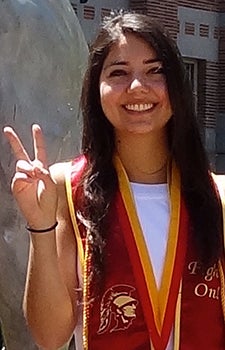
Samantha Freitag graduated in 2013 with a double major in international relations and business administration. After a stint working for Facebook, she will spend her Fulbright year as an English teaching assistant in Taiwan. Photo courtesy of Samantha Freitag.
Five months after graduating in May 2013, Samantha Freitag landed a job at Facebook. Working on the “child safety” team, she and her colleagues combed the website, screening and disabling inappropriate content.
“Working in the tech industry is great, but it was a hard job,” she said. “There was an overwhelming amount of bad content.”
More than that, she missed the international relations and cross-cultural subject matter she had studied as a USC Dornsife student. After eight months at Facebook headquarters in Menlo Park, California, she switched gears and accepted the Fulbright Teaching Assistantship in Taiwan she had applied for the summer after graduation.
As an international relations major, she chose to focus on Asia. After studying Spanish in high school, she relished the opportunity to delve into Asian languages. Looking for something “super challenging,” she studied Japanese for a year before spending her junior year abroad in Tokyo, where she lived with a host family and studied the language intensively. Then, during her senior year back at USC, she took up Mandarin Chinese.
In Taiwan, where Mandarin is spoken, she will be teaching English to elementary and middle school students.
“Based on my own language experiences, I know it’s really cool to be able to speak to other people in their own language. As a teacher in Taiwan, I really want to show this to my students and get them excited about learning English.”
In addition to improving her Mandarin, she hopes to hone her teaching skills.
“When I was in Japan, I helped my younger host brother with his English homework. Then he’d help me with Japanese, so it was a nice exchange. My mom was a Spanish teacher for many years, so she’s been giving me pointers and helping me prepare.”
—L.P.
An Advocate for Health: Rebecca Ryan

Rebecca Ryan, who earned her bachelor’s in neuroscience in 2009, will teach English in Thailand. She eventually wants to work with a school system to design and integrate an effective health education curriculum, then help implement health education policy. Photo courtesy of Rebecca Ryan.
As a new summer school principal in New Orleans, Louisiana, Rebecca Ryan knows that one thing that will thwart a dream from happening is the fear of failure.
“Being a principal has been a continual learning experience,” said Ryan, who earned her bachelor’s in neuroscience from USC Dornsife in 2009. She’s not too proud to seek out other leaders for support and advice.
“A big part of growing is making decisions and learning from my mistakes,” she said.
Ryan finds it rewarding to see new teachers grow into their roles in the classroom and become more confident with their students. “In return, it is amazing to see students’ confidence increase with the support of their teachers,” said Ryan, a middle school science teacher during the academic year. “One of the biggest challenges has been communication and making sure that teachers, students and parents are all on the same page and information is consistently shared.”
She will bring all of this experience to Thailand, where she will teach in a northeastern province called Maha Sarakham. As a Fulbright scholar, she will work at Thakhonkang Pittayakhom School as a middle and high school English teacher.
This is a path she didn’t predict. Ryan entered USC Dornsife set on pursuing medical school, but found her interests shifting toward education. She secured a position with Teach For America (TFA) to see if teaching was in her blood.
Through TFA, she found a need in education that merged with her interest in medicine.
“I saw a lack of health education occurring in K-12 public schools that seriously disadvantages students to leading healthy and successful lives,” said Ryan, who after her Fulbright will begin a master’s program in education policy at Columbia University.
At Columbia, Ryan will continue to merge her interest in medicine with education by researching health education policy. After earning her master’s, she plans to work with a school system to design and integrate an effective health education curriculum. Eventually, she wants to help implement health education policy.
She fondly remembers her time as an undergraduate and cites USC Troy Camp as a great influence.
“It introduced me to so many passionate people and charismatic children,” she said. “It also allowed me to work inside Los Angeles public schools and gain a perspective on education that has led me down my current path.”
—P.J.J.
Seeking Global Understanding: John Hernandez
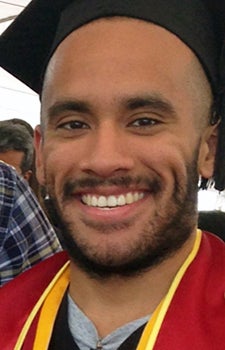
John Hernandez, who earned a dual degree in economics and mathematics in 2014, will teach English in Madrid, Spain. Eventually he wants to work in developing countries in Latin America, improving educational technology there. Photo courtesy of John Hernandez.
Taking a year off as an undergraduate at USC Dornsife, John Hernandez was hired as a tutor in Miami, Florida. A few months later, he secured a contract to work at a private Jewish school in North Miami, where he taught for the remainder of the year.
“The position made me fall in love with education,” he said. “The Fulbright teaching assistantship will be a great continuation of everything I’ve been doing.”
Hernandez graduated in May 2014 with a dual bachelor’s degree in mathematics and economics. A native Spanish speaker, Hernandez embraced the opportunity to travel to Spain, where he will teach English at IE University in Madrid.
In addition to teaching, he will embark on an independent project that will draw on his economics and math background. He will research nonprofit organizations in Spain, focusing on how they have fared over the past five or six years during the country’s severe financial crisis. He plans to analyze data related to government programs and the educational system — educational inequity in particular.
Eventually Hernandez wants to work in developing countries in Latin America, where he will seek to improve educational technology. He wants to help build software that can become teaching and learning tools, whether for science and math or for those working toward a technical degree and/or career advancement.
“Even though Spain isn’t a developing nation, I want this experience to give me the confidence to jump into developing countries, make me feel ready to travel to places I’ve never been and give me a global understanding of the world.”
—L.P.
Empathetic Doctor-in-the-Making: Bijou Diem Tran Nguyen
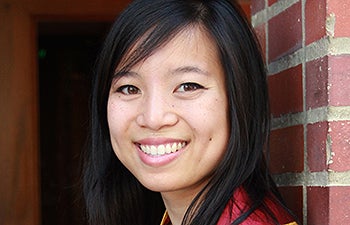
Bijou Diem Tran Nguyen, who earned her bachelor’s degree in history in 2014, will teach English in Korea as a way to garner cultural perspectives in her quest to become a physician. Photo courtesy of Bijou Diem Tran Nguyen.
Growing up in Southern California, Bijou Diem-Tran Nguyen was always intrigued by Korean American culture, from its food to its soap operas. As a history major at USC Dornsife, she had the opportunity to study the country in-depth. The course “Introduction to Asian American History” resonated with her.
“We learned about the experiences of different Asian cultures in America, that their experiences assimilating and adjusting to America were unique as a result of their backgrounds,” said Nguyen, who is first generation Vietnamese.
Nguyen also learned that as South Korea has become industrialized, the country’s culture has maintained the integrity of its past.
“It boasts vibrant pop culture, drama and music, yet it carries on its traditions such as respecting one’s elders,” she said.
This July, Nguyen will continue her exploration into Korean culture as she teaches English as a Fulbright scholar in Korea. After six weeks of training in Seoul where she will learn teaching strategies and the basics of Korean language, she will be assigned to a classroom outside of the capital and will act as a cultural ambassador of sorts for the United States.
Nguyen earned her bachelor’s from USC Dornsife in May, and has previously taught in Uganda and the Azores Islands.
“My goal for teaching is one of mutual benefit: I hope to learn as much from my students as they learn from me, in terms of their backgrounds and their own personal stories,” she said.
Upon her return, Nguyen will pursue her medical doctorate at Keck School of Medicine of USC. She aspires to become a physician, and believes her experience abroad will develop her independence, confidence and cultural empathy.
“I think what will make me a good health care provider is the way I cherish every interaction I have with others,” she said. “This respect and unconditional support is what I will bring to Korea.”
—M.B.
Identity Building: Samir Kumar
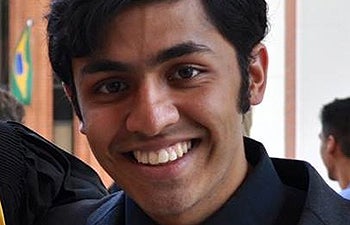
Samir Kumar, who earned his bachelor’s degree in economics/mathematics and international relations in 2013, will teach English in Sri Lanka and study the country in the wake of its 1983 to 2009 civil war. Photo courtesy of Samir Kumar.
As an undergraduate at USC Dornsife, Samir Kumar studied national identity and conflict in postcolonial South Asia. His research focused on how historical and collective memory has shaped foreign policy in Jammu and Kashmir, a small and long-disputed territory located between Pakistan, India and China. In New Delhi, Kumar interviewed a historian, a former official who served in the Indian government, a former Indian army officer and think tank members.
“With that work, I became more intimately familiar with how narratives are processed through different structures of a country’s society — how identities are built and cast aside,” said Kumar, who earned his bachelor’s in economics/mathematics and international relations in 2013. “It is very compelling, because you as the researcher have the opportunity to directly empathize with people as you process their narratives. You do this while maintaining an understanding of social challenges and how one might go about solving them.”
In November, Kumar will travel to Sri Lanka where he will teach English as a Fulbright scholar. After intensive training to strengthen his teaching skills and to learn local languages such as Tamil, Sinhala and Hindi, he will teach English and composition to middle school, high school or college students.
While in Sri Lanka, Kumar plans to continue conducting research. From 1983 to 2009, Sri Lanka was embroiled in a civil war. Kumar would like to study the experiences of minority communities in the wake of reconciliation. He is also interested in the economics of redevelopment for communities impacted by the civil war.
Upon his return, Kumar wants to continue his studies in the international affairs of South Asia by pursuing either a master’s degree or Ph.D. in international relations or public policy. His year abroad will help him decide what career to seek, whether in journalism, academia, working for a startup or in government.
“The Fulbright experience will be a great opportunity for me to develop my leadership skills and become a better teacher,” Kumar said. “This will be beneficial in any path I choose.”
—M.B.
Latin America and Asian Connection: Fan Fan
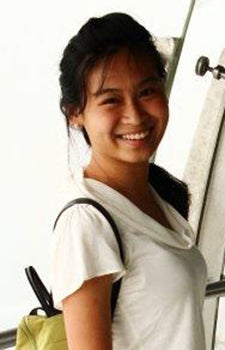
Fan Fan, who earned her bachelor’s degree in comparative literature with an emphasis in Spanish in 2014, will travel to Brazil to teach English at a teacher’s college and conduct research related to the intersections of Asian and Latin American cultures. Photo courtesy of Fan Fan.
As a senior, Fan Fan practiced her Portuguese skills with a third generation Japanese-Brazilian student from the American Language Institute (ALI), housed in USC Dornsife. They met weekly to practice speaking each other’s language. Fan, who was born in China but raised in Atlanta, Georgia, also enjoyed helping him navigate American culture.
“I’d introduce him to popular student restaurants, like Chipotle, and talk to him about aspects of American culture you don’t learn in the classroom.”
Fan, who graduated in May 2014, also served as an undergraduate consultant for ALI, working with international graduate students seeking to become teaching assistants. She helped familiarize them with American undergraduate culture so they could teach more effectively.
She will bring this spirit of cultural sharing to Brazil as an English teaching assistant at a teacher’s college.
At USC Dornsife, Fan spent a summer studying in China as a Global East Asia scholar and a semester abroad in Chile. She also researched local issues in Hong Kong with a Problems Without Passports class. A comparative literature major with an emphasis in Spanish, Fan’s travels cemented her interest in the connections between Latin America and Asia, the subject of her senior thesis.
“I’m very interested in race and the cultural production of politics in these regions, and after all my emphasis on Spanish-speaking Latin America, I wanted to learn more about Brazil,” she said. “Also, I’m excited to learn more about the strong presence of Asian immigrants in the country.”
Ultimately Fan wants to pursue a career in academia. In Brazil, she plans to conduct preliminary research to help narrow her focus for Ph.D. studies. Interviews with Chinese immigrants living in Brazil will give her insight about why they came and what their experiences have been.
In her teaching role, Fan wants to connect her English students with Portuguese-language students at USC.
“They could talk with each other on Skype, or email questions back and forth about classes or their daily lives. I think it would be a great interactive element that would enrich the classes in both schools.”
—L.P.
The Politics of Hong Kong: Vivian Yan
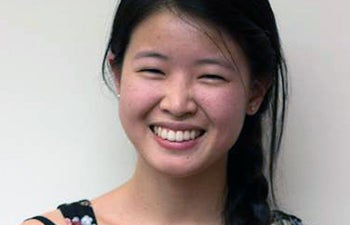
A graduate in comparative literature and history, Vivian Yan will spend her Fulbright year in Hong Kong where she will investigate issues of identity and political activism and how they are affected by ethnic and social diversity. Photo courtesy of Vivian Yan.
Vivian Yan’s Fulbright research project grew out of a USC Dornsife Problems Without Passports trip she took last summer to Hong Kong and Macau.
“The trip allowed me to dive into the history and politics of these two post-colonial cities,” said Yan, a Mellon Mays Undergraduate Fellow who graduated from USC Dornsife in May with a double major in comparative literature and history. “I am interested in exploring the politics of Hong Kong in relation to mainland China today through that post-colonial lens, while incorporating issues of race, gender and power.”
As a Fulbright Scholar, Yan will spend an academic year in Hong Kong examining the extent to which ethnic and social diversity shapes the ideologies created by political activism and exploring how these tensions create or destabilize ideas of Hong Kong identity.
Studying at the University of Hong Kong, Yan intends to use her Fulbright to create a foundation for graduate research in history or American studies.
She is particularly interested in the apparent dichotomy between the city’s pro-democratic stance and its often lamentable treatment of foreign domestic workers.
For instance, each year on June 4, Hong Kong holds a vigil to commemorate the 1989 Tiananmen Square Massacre in which military troops with assault rifles and tanks killed hundreds of unarmed student demonstrators in Beijing.
“Many of Hong Kong’s citizens are very invested in the democratic future of the city and tout this democratic, modernized cosmopolitan identity,” she said. “I find that very interesting when you contrast it with the controversy over the undemocratic way Hong Kong often treats its minority domestic workers, who come principally from South East Asia, the Philippines and Burma.
“I am interested in looking at that intersection and examining to what extent these pro-democracy movements in Hong Kong have an impact on activists campaigning for the rights of domestic workers.”
— S.B.